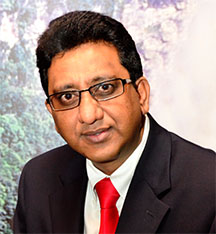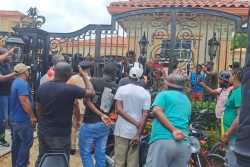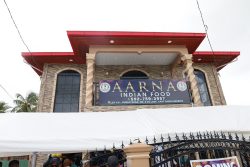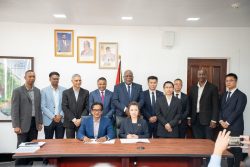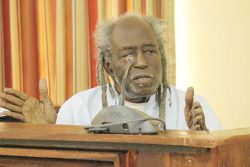Leader of the Opposition Bharrat Jagdeo will today ask the High Court to quash President David Granger’s unilateral appointment of retired justice James Patterson as Chairman of Gecom on the grounds of unconstitutionality.
“We will ask the court to declare the appointment by President Granger, of James Patterson as Chairman of the Guyana Elections Commission, contrary to and in breach of Article 161 (2 ) of the constitution, that it is unconstitutional, illegal, unlawful, null, void and of no effect,” the plaintiff’s Attorney, Anil Nandall, told Stabroek News, yesterday.
Further, he added “An order directing the removal of Justice James Patterson (retired) from the post of Chairman of Gecom and an order directing the President to choose a name from the 18 names submitted to him by the leader of the opposition or alternatively to request from the leader of the opposition six additional names for the appointment for the Chairman of Gecom. Also a declaration that Mr. James Patterson is not qualified, in accordance with article 161(2) of the constitution, to be appointed a chairman of Gecom.”
On Thursday night, Patterson, 84, was sworn in as the new Gecom Chairman, just hours after being asked to take up the appointment by the president, who rejected three lists submitted by Jagdeo.

Granger, who said the lists submitted were unacceptable, said that he selected Patterson under the proviso to Article 161 (2) of the Constitution, which allows him to unilaterally appoint a judge, former judge or a person qualified to be a judge, if the Opposition Leader fails to submit a list as provided for in the law.
Jagdeo has since accused the president of acting in violation of the Constitution and announced that the opposition would adopt a stance of non-cooperation with the government while signaling that he would take to the local court and was prepared to proceed to the Caribbean Court of Justice (CCJ) if necessary.
Nandall said that he will argue that the President initially misinterpreted Article 161 (2) of the Constitution by saying that it only qualifies a judge, a former judge or a person eligible to be a judge, to be appointed as the Chairman of Gecom. When this interpretation was met with public condemnation, Nandlall said that Granger was forced to recognise that that provision of the Constitution also caters for any “fit and proper” person to be considered. But even then, the President and his Attorney General injected another “nonsensical slant” to their interpretation by arguing that the Constitution expresses a preference for the judicial category.
Infantile
“These infantile interpretations to the clear language of the Constitution were all put to rest by the Chief Justice’s ruling. Now the President has deliberately misinterpreted the other part of Article 161 (2), that is, the proviso. When one examines the intention of the framers of the Constitution, which was to create a bi-partisan mechanism to produce a chairman of Gecom, no rational mind would be unclear when the proviso can be activated. It can only be activated when no list has been submitted by the Leader of the Opposition. Once a list has been submitted, this proviso has no applicability. Any other interpretation would make a mockery to the letter but moreover, the spirit of the Constitution because every President would then be free to reject a list submitted to him by the Leader of the Opposition and then appoint a person of his own choice, rendering the very constitution otiose, superfluous and nugatory. (Former US) President (Jimmy) Carter and those who coined the Carter(-Price) Formula were not that naïve,” Nandlall said.
‘A duty is placed on the Leader of the Opposition to submit a list of six names, not unacceptable to the President from which the President is empowered to choose one. Since the Leader of the Opposition is not endowed with clairvoyant powers or an ability to read the President’s mind, the framers of the Constitution could not have expected and do not expect him to know which names the President would find not unacceptable. Therefore, the responsibility is on the Leader of the Opposition to select six names that in his opinion, the President would find not unacceptable. To his credit, the Leader of the Opposition did not confine the 18 names submitted to his subjective judgement, he engaged every important organisation in this country in a consultative process which produced those names. Simultaneously, when the Constitution vests the President with a power to determine acceptability of a name, the framers of the Constitution expect and the law mandates that power must be exercised rationally and reasonably not capriciously and whimsically and in a manner that any reasonable President would do in the circumstances. To enable him space to exercise that power, the Constitution was fair enough to give him six choices. In this particular instance, he had 18 choices,” he added.
A former Attorney General, under the PPP/C’s last government, Nandall said that he understands that some will argue on the excerpt of Article 161, “Provided that if the leader of the opposition fails to submit a list as provided for” saying that it was subject to interpretation. But he argues that “as provided for” could not be taken in isolation.
Nandlall posited, “The literal language of the provision cannot be read in isolation from the spirit and intention of the framers of the constitution. Therefore, it is imperative to go back to the Carter formula which was essentially constitutionalized in that provision. And the intention was to create a bipartisan commission of six commissioners, three presenting the government and three representing the opposition, and with a chairman produced from a consensual process involving the leader of the opposition and the president.”
“That is why the president’s power is circumscribed to a list of names presented to him by the leader of the opposition. He has no power to appoint, outside of that list once a list is presented. It is only when no list is presented as is required which means a list of six names from the leader of the opposition, then he has the power to make an appointment of his own choice,” he stressed.
He said that he will explain to the court that the perversity of the decision by the President to act unilaterally is compounded by the fact that the President has not given a single reason for rejecting 18 accomplished, professionally qualified and respected Guyanese.
And while he will not ask the court to rule for an explanation on why any of the 18 persons was rejected, Nandall said that he believes that the President led the nation to believe, through several public statements, that he would not act unilaterally but will pursue a collaborative course on this issue to the very end.
“So on that note, the President has simply lied to the nation. If anyone was in doubt about the President’s bonafides in this matter, those doubts would have immediately dissipated by the choice the President made in the form of Justice Patterson,” he said.
